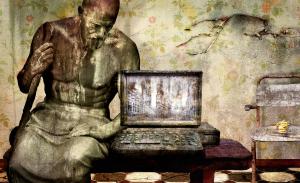
At the end of the movie Knight of Cups, the final moment is marked by Rick, the film’s protagonist, who says “Begin”.
I just got back from a retreat run by the Fraternity of Communion and Liberation (CL), where Fr John O’Connor of Food for Faith, built on the spiritual exercises of CL’s leader, Fr Julian Carron. The exercises centered on a line taken from Isaiah (43:19), where God through the prophet says: See, I do a new thing…do you not perceive it? It is a line that the one seated on the throne would later declare in a similar form at the dawning of the new heaven and earth (Rev 21:5), before identifying himself with both beginning and end, the alpha and omega (21:6).
While retreat focused on the theme of perception, the coupling of Jesus with newness was what struck me. It affirmed a pointed made by Pope Francis in his 2018 Easter Vigil homily, in which he spoke of a “crushing routine that robs memory, silences hope, and leads to thinking that ‘this is the way things have always been done'”.
I wrote in another piece about how the life of sin can, as James Alison argued, be identified as a compulsion towards repetitiveness. This repetitiveness can be a vain repetition of action to get a happiness that can never be found, or a repetition of thinking that presumes that happiness will never be found. By contrast, Christ breaks into the routine as a newness.
Scripture has the above passages to couple Christ with the new, but a more fundamental coupling can be seen in the prologue of the Gospel of John, where John not only recapitulates history back to its very beginnings, but also couples those beginnings with the Word of God, that would later become flesh and then enter into our history. The Divine Word of God was thus the locus of creation’s beginning.
Taking up from the ancient fathers, St. Bonaventure would go one further when he stated that since it is through the Divine Word that all creation has its beginning, the ongoing existence of every creature is due to the Divine Word leaving an imprint of itself into the DNA of all things, animate and inanimate. What can be drawn from Bonaventure is that the logos of beginning is built into all of creation.
Against the logic of routine, every atom in creation reverberates with the possibility of what Alain Badiou calls “pure beginning”. Every moment in history (this includes our individual histories too), taking up these atoms of creation, is a potential unfolding of a new beginning promised by God. What is more, even moments in history that declare the final end to the hope in new things like an existential tombstone, those moments still bear the imprint of Christ the incarnate Word, and thus the presence of Christ who makes new all things, even the ones that bear the hallmark of “crushing routine” and finality.
This is why Pope Francis can say in his homily that the tomb stone, the supposed guarantor of the finality of death, can nonetheless become the first witness to the new thing of the defeat of death, the defeat of finality. But the cold stone witnesses not the defeat per se, but to the risen Christ, the risen alpha.
The question that arises for us now is whether we, in the circumstances of our own histories, can look at the seeming fixity of those circumstances and recognise that behind their declaration of finality, works Christ and with Christ, the hope of an unfolding of a beginning in your own life.
To paraphrase an essay by Creston Davis and Aaron Riches in the book Theology and the Political, the practice of the Christian life, as a practice of ongoing fidelity to Christ as pure beginning, is inseparable from declaring the empire of finality dead.










